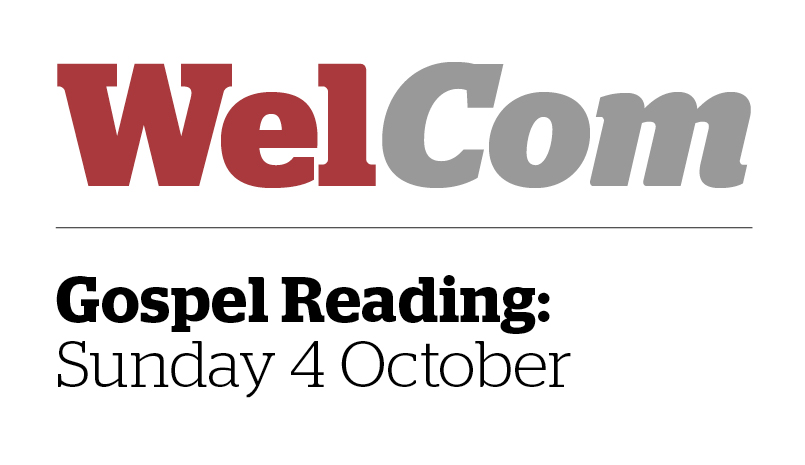WelCom October 2020
Twenty-seventh Sunday in Ordinary Time
Gospel, Matthew 21:33-43
33 Jesus said to the chief priests and the elders of the people: ‘Listen to another parable. There was a man, a landowner, who planted a vineyard; he fenced it round, dug a winepress in it and built a tower; then he leased it to tenants and went on a journey. 34 When vintage time drew near he sent his servants to the tenants to collect his produce. 35 But the tenants seized his servants, thrashed one, killed another and stoned a third. 36 Next he sent some more servants, this time a larger number, and they dealt with them in the same way. 37 Finally he sent his son to them thinking, “They will respect my son.” 38 But when the tenants saw the son, they said to each other, “This is the heir. Come on, let us kill him and take over his inheritance.” 39 So they seized him and threw him out of the vineyard and killed him. 40 Now when the owner of the vineyard comes, what will he do to those tenants? 41 They answered, “He will bring those wretches to a wretched end and lease the vineyard to other tenants who will deliver the produce to him at the proper time.” 42 Jesus said to them, ‘Have you never read in the scriptures: The stone which the builders rejected has become the cornerstone; this is the Lord’s doing and we marvel at it? 43 I tell you, then, that the kingdom of God will be taken from you and given to a people who will produce its fruit.’
Parable of the Wicked Husbandmen*
A reflection on Matthew 21: 33-43
Tom Gibson
This parable is told by the three synoptic evangelists during Holy Week. Matthew includes it in chapter 21, verses 33-46. A strong recurring theme throughout the gospels is one in which Christ scorns the well-to-do, instead favouring the poor. Christ is a representative and leader of this group. This parable is no exception. It is about a group of wicked farmhands who reject the servants of the landowner, including his own son. The farmhands represent the Pharisees and scribes who were supposed to be the spiritual leaders of the Jews. The son represents Christ who the Pharisees (farmhands) rejected. Christ quotes an Old Testament reference which likens the Jewish leaders as masons who reject what appears to them to be an ordinary stone, but later – unbelievably and contrary to all expectations – becomes the corner stone of the whole building. Clearly Christ is the cornerstone.
Who do we represent? Are we like the farmhands who allow their worldly values and expectations to prescribe what God’s servants should look like, how they should act and indeed what God’s work should consist of? How do we see our own vocations? Do we accept that the many roles we play in society, whether in paid or voluntary work, belong to God? If so, how do we measure the effectiveness of our work?
My wife Val and I owned our farm for 54 years. Farming the land and bringing up six children was work we considered to be our life’s vocation. We realised the land was never truly ours – or the bank’s – and believed our duty was to produce as much food as science would allow. Frequently we over-reached our ability to identify our limit, but we never stopped striving to do better. We realised we were God’s tenants, there at His pleasure. We sold the farm five years ago, before retiring into Stratford.
We learned early of our good fortune. Farm ownership for a couple so young was unusual. There were of course many appeals for funds from many worthy organisations. Val encouraged a policy of never turning an appeal down. Kaponga then, was a new Catholic parish, established in a rural village with a new Town Hall, a pub and TAB as well as two dairy factories, two schools, two garages, three banks and two stock and station firms, that enjoyed a youthful population. Anglicans, Presbyterians and Methodists had their own well-attended churches. Our new farm had a new house, but our first parish priest had to board with a generous parishioner. World War Two had ended 15 years earlier and the population was changing rapidly with several enthusiastic young people working to bring the district into the post-war era. The one aspect the people shared was generosity and we enjoyed being part of that.
I write this reflection during Social Justice Week noting that during the lockdown, the richest 20 per cent of the population made money, while the other 80 per cent were worse off. What is the true meaning of wealth and what is the meaning of true wealth? That we can even ask these questions suggests we have more than enough to give away to those who are physically struggling. Do they have spiritual gifts for us and are we prepared to listen to them? Given that the Synoptic gospels show Jesus’ empathy for those least respected in our community, how are we including them in our circle?
What is our church doing and how is it helping us to recognise true and meaningful cornerstones in the spiritual sense? Cornerstones which the world might otherwise see as rubble and unnecessary debris, but which God considers essential for building His Church here in Stratford? Could we be criticised for being like the husbandmen of this parable who had no appreciation for the contributions of others who were sent to help them?
*Husbandman: a person who ploughs and cultivates the land; a farmer.
